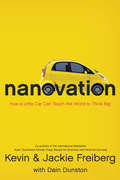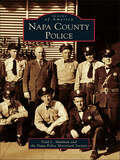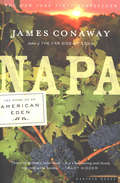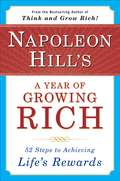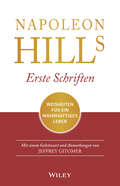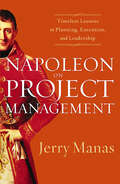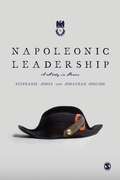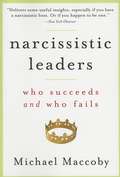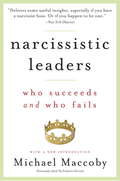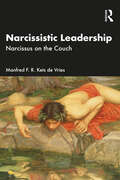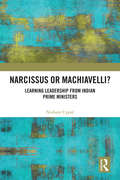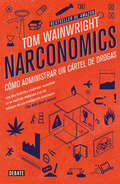- Table View
- List View
Nanotechnology: The Business (Perspectives in Nanotechnology)
by Michael T. BurkeFor the new nanotechnology entrepreneur, starting up a venture requires concise navigation through a sea of developmental red tape. This predicament is true of any startup, nano or not, but is particularly exacerbated by the fact that nanotechnology is a new and potentially disruptive technology.A unique exposition on starting and running a nano-business, this indispensible reference: Includes samples of important corporate and operational documents Explores the intricate relationship between new technology development and the creation of new businesses Provides tips on managing people of diverse educational backgrounds Incorporates information on patents, business ethics, record keeping, and marketing Nanotechnology: The Business presents an in-depth discussion of available corporate structures, delineating the advantages and disadvantages of each. It also describes an array of other issues the nano entrepreneur will encounter, from business plans and financing to budgeting, facilities procurement, and staffing. With a scope like no other book of its size, this handy guide equips nano entrepreneurs with the expertise needed to sail smoothly through startup and ensure successful operations after initial incorporation.
Nanovation
by Kevin Freiberg Jackie Freiberg Dain DunstonDo you have the eyes, the ears, and the hands to be a Nanovator? You're about to find out. In India, entire families?too poor to afford a car?crowd onto a single motor scooter every day to brave the tangled traffic lurching through the streets. One evening Tata Motor's venerable chairman Ratan Tata witnessed something on those rain-soaked streets that both horrified him and birthed a dream: an overloaded scooter lost traction in a busy intersection and sent several members of the family tumbling across the pavement. In that moment Nanovation took root in Tata's imagination. The very idea was supposed to be impossible. A safe and appealing family car for the price of a motor scooter? The experts dismissed it. But Ratan Tata was undeterred. When budget constraints, design restrictions, the rising costs of materials, and political agitation threatened to derail the project, Team Nano pressed on. This is the story of how, in the face of insurmountable odds, Tata Motors created one of the greatest innovations in the auto industry since Model-T. Nanovation has disrupted an entire industry and changed the game for India forever. Imagine what it can do for your business. Is your company changing the way society functions? What's your Nanovative idea? It's time to get moving! Warning! Don't read this book unless you are ready to challenge management dogma, taken-for-granted assumptions, and outdated systems by asking "what if?" and "why not?" to some of your industry's toughest questions. But, if you're ready to revolutionize the products you make, the processes you use, and the companies you build, pull up a seat at the drafting table with the creators of the Nano, the most important car to roll off the assembly line in decades. Discover the thinking that bred their ingenuity and the leadership that encouraged them to overcome adversity, to take risks despite their fear of failure, and to innovate beyond their customer's wildest expectations. Endorsements: "If you're interested in stoking the fires of innovation and making a profit while making a difference, Nanovation is a must read." ?Indra K. Nooyi, chairman and CEO, PepsiCo "The Freiberg's deep dive into a company that transformed an entire industry is loaded with hands-on-advice- and a warning not to downsize your dreams!"- Gary Kelly, chairman, president and CEO, Southwest Airlines "Nanovation is for leaders who want to leave a lasting legacy in the world." ?Chris Connor, chairman and CEO, Shermin-Williams Company "Read Nanovation and learn what you can do to create an innovative culture in your organization." ?Ken Blanchard, co-author One Minute Manager, Full Steam Ahead, and Lead with LUV "Nanovation is a must read for any leader." ?Eric Danziger, CEO, Wyndham Hotel Group "Nanovation is for leaders who want to shake it up." ?Bruce Bochy, manager, 2010 World Champion San Francisco Giants "Vibrant and energetic, the passion of the authors reflects that of the innovators it chronicles...A practical guide for creating a radical culture of innovation." ?N.R. Narayana Murthy, founder-chairman and chief mentor, Infosys Ltd.
Nantucket Nectars: The Exit
by William A. Sahlman Noam Wasserman Joseph B. LassiterThe founders of Nantucket Nectars are trying to decide whether and how to sell their company.
Napa County Police (Images of America)
by Todd L. Shulman Napa Police Historical SocietyThe story of organized law enforcement in Napa County begins with the very first meeting of the board of supervisors in 1850 and the appointment of a county sheriff and marshals for each township. Thefoundations for progress and prosperity in place, Napa County grew from a remote agricultural outpost to the preeminent wine-growing region in the United States and a booming tourist destination�and policinghas kept pace. Today, in addition to the Napa Sheriff�s Department, the county is protected by the California Highway Patrol and three police departments: Napa, St. Helena, and Calistoga. Specialized police agencies have also grown out of unique needs, including the Napa State Hospital Police, Railroad Police, and Community College Police.
Napa at Last Light: America's Eden in an Age of Calamity
by James ConawayThe New York Times bestselling author of Napa tells the captivating story of how the Napa Valley region transformed into an extraordinary engine of commerce, glamour, and an outsized version of the American dream—and how it could be lost—in &“a strong plea for responsible stewardship of the land&” (Kirkus Reviews).Not so long ago, wine was an exclusively European product. Now it is thoroughly American; emblematic of Napa Valley, an area idealized as the epicenter of great wines and foods and a cultural tourist destination. But James Conaway&’s candid book tells the other side of the romanticized story. Napa at Last Light reveals the often shadowy side of the latter days of Napa Valley—marked by complex personal relationships, immense profits, passionate beliefs, and sometimes desperate struggles to prevail. In the balance hang fortunes and personal relationships made through hard work and manipulation of laws, people, and institutions. Napans who grew up trusting in the beneficence of the &“vintner&” class now confront the multinational corporations who have stealthily subsumed the old family landmarks and abandoned the once glorious conviction that agriculture is the best use of the land. Hailed as the definitive Napa writer, Conaway has spent decades covering the region. Napa at Last Light showcases the greed, enviable profits, legacy, and tradition that still collide in this compelling story. The area is still full of dreamers, but of opposing sorts: those longing for a harmonious society based upon the vine, and self-styled overlords yearning for wealth and the special acclaim only fine wine can bring. Bets are still out on what the future holds. &“This is a stunning and sad look at how an idyllic community became a victim of its own success…fascinating and well-researched&” (Publishers Weekly, starred review).
Napa: The Story of an American Eden
by James ConawayThe New York Times–bestselling history of the rise of California&’s wine country and its most famous vintners—from the author of Napa at Last Light. James Conaway&’s remarkable bestseller delves into the heart of California&’s lush and verdant Napa Valley, also known as America&’s Eden. Long the source of succulent grapes and singular wines, this region is also the setting for the remarkable true saga of the personalities behind the winemaking empires. This is the story of Gallos and Mondavis, of fortunes made and lost, of dynasties and destinies. In this delightful, full-bodied social history, Conaway charts the rise of a new aristocracy and, in so doing, chronicles the collective ripening of the American dream. Napa is a must-read for anyone interested in our country&’s obsession with money, land, power, and prestige. &“An extraordinary American success story: a pageant of family dramas and blood feuds.&” —People &“This is more than a &‘wine book&’—it is a fascinating and closely reported social history.&” —Tracy Kidder
Napalm: From Soldiers Field to Trang Bang
by Tom Nicholas Jonas Peter AkinsNapalm is one of the most destructive weapons ever to be invented. Yet, at its original inception it was nothing more than a technical challenge, and it was never intended to be used in indiscriminate antipersonnel warfare. The pathway of its development by a Harvard research scientist to its use in flamethrowers by U.S. ground troops in World War Two, and as an incendiary device during the Vietnam War (1959-75) was unanticipated. Many of the early technical challenges associated with Napalm were solved by experimentation under the guidance of the National Defense Research Committee (NDRC), created to coordinate scientific research into the problems of modern warfare. Because the government needed private contractors to manufacture Napalm, it turned to several companies with experience in chemicals manufacturing. One in particular - The Dow Chemical Company - bore the brunt of the moral opprobrium association with the production of Napalm.
Napkin Finance: Build Your Wealth in 30 Seconds or Less
by Tina HayWALL STREET JOURNAL BESTSELLER“An incredible, compelling read. It covers an astonishing amount of ground with basic simplicity and good humor. A masterful starting point for any investor. Tina Hay is a wizard.”—Ben Stein, economist, author, actor and commentatorA handy crash course in personal finance, Napkin Finance is the groundbreaking guide everyone needs to help them manage their money and feel more secure.Surveys have found that two thirds of Americans can’t pass a basic financial literacy test, and nine in ten believe personal finance should become a required high school course. Tina Hay understands the confusion. While attending Harvard Business School, she struggled to keep up with classmates–many of whom came from the banking world–when it came to understanding jargon and numbers-heavy concepts. Tina developed a visual learning strategy using sketches and infographics that helped her succeed in her studies and master even the most complex financial topics.Since then, Tina founded Napkin Finance, a thriving company built on the concept of taking seemingly overwhelming topics—such as budgeting, investments, and retirement accounts—and turning them into simple, skimmable explanations. Now, she’s synthesized the most important content into this personal finance handbook. Napkin Finance includes dozens of individual learning modules, on topics ranging from credit scores to paying off student loans to economics and blockchain. The first illustrated guide that makes finance fun and accessible, Napkin Finance can help even the most numbers-phobic reader learn about complex financial topics without dying of boredom.
Napoleon Hill's Golden Rules: The Lost Writings
by Napoleon HillNapoleon Hill's Golden Rules: The Lost Writings consists of a series of magazine articles Napoleon Hill wrote between 1919 and1923 for Success Magazine, of which he eventually become an editor. Hill's obsession with achieving material success had led him from poverty stricken Appalachian Mountains with the desire to study successful people. These articles focus on Hill's philosophy of success, drawing on the thoughts and experience of a multitude of rags-to-riches tycoons, showing readers how these successful people achieved such status. Many of his writings such as the chapter on Law of Attraction, written in the March 1919 issue, have recently basis of several bestselling books. Readers will discover principles that will assure their success if studied and put into action. Chapters include: Lesson #1: Your Social and Physical Heredity--Hills Golden Rule (May 1920) Lesson #2: Auto Suggestion--Napoleon Hill's Magazine (July 1921) Lesson #3: Suggestion (Applied Salesmanship)--Napoleon Hill's Magazine (August 1921) Lesson #4: The Law of Retaliation--Hill's Golden Rule (March 1919) Lesson #5: The Power of Your Mind (Little Odd Visits with Your Editor)--Hill's Golden Rule (October 1919) Lesson #6: How to Build Self-Confidence--Napoleon Hill's Magazine (June 1921) Lesson #7: Environment and Habit--Hill's Golden Rule (April 1919) Lesson #8: How to Remember--Hill's Golden Rule (May-June 1919) Lesson #9: How Marc Antony Used Suggestion in Winning the Roman Mob--Hill's Golden Rule (July 1919) Lesson #10: Persuasion vs. Force--Hill's Golden Rule (September 1919) Lesson #11: The Law of Compensation--Napoleon Hill's Magazine (April 1921) Lesson #12: The Golden Rule as a Pass Key to All Achievement--Napoleon Hill's Magazine (June 1921)
Napoleon Hill's a Year of Growing Rich: 52 Steps to Achieving Life's Rewards
by Napoleon Hill W. Clement StoneThe phenomenal bestseller Think and Grow Rich established Napoleon Hill as an authority on motivation and success. These revised and updated motivational and inspirational passages-keys to wealth, power, happiness, and good health-were originally published in Hill's magazine, Success Unlimited.From the Trade Paperback edition.
Napoleon Hills Erste Schriften: Weisheiten für ein wahrhaftiges Leben
by Jeffrey GitomerDer "New York Times"-Bestsellerautor Jeffrey Gitomer bietet Ihnen in diesem Buch Zugang zum geistigen Erbe von Napoleon Hill: seine lang verlorenen Originalnotizen, Briefe und Vorträge - jetzt zusammengestellt, bearbeitet und kommentiert für den modernen Leser. Zwanzig Jahre vor der Veröffentlichung seines Magnum Opus "Denke nach und werde reich" war Napoleon Hill Dozent, Philosoph und Schriftsteller am George Washington Institute in Chicago, wo er Kurse in Werbung und Verkauf gab. Diese seltenen Vorträge galten als historisch verloren. Bis jetzt. Jeffrey Gitomer hat exklusiv Zugang zu den Archiven der Napoleon Hill Foundation erhalten und Hills ursprüngliche Kurshinweise ausgegraben, die die grundlegenden Überzeugungen über harte Arbeit und persönliche Entwicklung enthalten, die Hill als einen globalen Führer des Erfolgs und der positiven Einstellung etablierten. In diesem Buch hat Jeffrey Gitomer Napoleon Hills grundlegende Weisheit für das 21. Jahrhundert eingefangen. Diese einfach zu implementierenden Strategien für das Leben, die Familie und das Geschäft erweisen sich heute als ebenso anregend und inspirierend wie vor fast hundert Jahren.
Napoleon on Project Management: Timeless Lessons in Planning, Execution, and Leadership
by Jerry ManasWhat is it about Napoleon Bonaparte that has led recognized leaders such as General George S. Patton to study his principles and inspired countless books on management and leadership to quote his maxims? Napoleon on Project Management explores the key principles behind this great historic leader’s successes to provide project managers the recipe for managing commitments and propelling their teams to victory. You’ll learn how to: leverage timeless wisdom to improve your project performance; prepare your team for battle through superior communication skills; apply Napoleon-level research, record-keeping, and organization methods to each of your projects; and gain an upper hand by understanding and leveraging the complex and essential dynamic between project management and strategic leadership. Who says history shouldn’t repeat itself? By exploring the leadership strategies that stand the test of time and learning how to avoid the triggers that ultimately lead to Napoleon’s downfall, you’ll learn how to strengthen and reinvigorate your modern-day project management practices, conquer every challenge, and help your organization grow and thrive.
Napoleon, CEO: 6 Principles to Guide & Inspire Modern Leaders (CEO)
by Alan AxelrodThe next in Alan Axelrods engaging and popular CEO series spotlights a perfect subject: Napoleon, the brilliant military strategist who also laid the administrative and judicial foundations for much of Western Europe. Axelrod looks at this much-studied figure in a new way, exploring six areas that constitute the core of what made Napoleon a great leader: Audacity, Vision, Empathy, Strategy, Logistics, and Tactics. Within these areas Axelrod formulates approximately 60 lessons framed in military analogies, valuable for anyone who aspires to leadership, whether in the boardroom or the Oval Office.
Napoleonic Leadership: A Study in Power
by Stephanie Jones Professor Jonathan Gosling‘Whether you are studying leadership, or doing leadership, this is a rollicking good read, and a fabulously rich book.’ - Ken Parry, Professor of Leadership Studies and co-Director of the Deakin Leadership Centre, Australia He came to France an immigrant and left an exile – but, in a career spanning just 35 years, he became general, consul and emperor. How did Napoleon’s name come to be synonymous with brilliance, legend and glory despite displaying opportunistic and manipulative tendencies, and repeatedly deserting those that followed him? 200 years after his defeat, what lessons can we learn from his successes and his failures? As the world marks the 200th anniversary of the Battle of Waterloo, this fascinating study on leadership and power tackles the questions that continue to intrigue and mystify. As now, power was gained and held by political manipulation, patronage, fear, putsch, charisma, popular vote and the new idea of meritocracy. Through the inclusion of Reflections and Questions, Jones and Gosling also highlight some important lessons for current and future managers and leaders. Visit the authors’ website www.napoleonic-leadership.com for a Diagnostic Exercise, Power questions and Chronology of Leadership.
Napoleonic Leadership: A Study in Power
by Stephanie Jones Professor Jonathan Gosling'Whether you are studying leadership, or doing leadership, this is a rollicking good read, and a fabulously rich book.' - Ken Parry, Professor of Leadership Studies and co-Director of the Deakin Leadership Centre, Australia He came to France an immigrant and left an exile - but, in a career spanning just 35 years, he became general, consul and emperor. How did Napoleon's name come to be synonymous with brilliance, legend and glory despite displaying opportunistic and manipulative tendencies, and repeatedly deserting those that followed him? 200 years after his defeat, what lessons can we learn from his successes and his failures? As the world marks the 200th anniversary of the Battle of Waterloo, this fascinating study on leadership and power tackles the questions that continue to intrigue and mystify. As now, power was gained and held by political manipulation, patronage, fear, putsch, charisma, popular vote and the new idea of meritocracy. Through the inclusion of Reflections and Questions, Jones and Gosling also highlight some important lessons for current and future managers and leaders. Visit the authors' website www.napoleonic-leadership.com for a Diagnostic Exercise, Power questions and Chronology of Leadership.
Naranya: Created in Mexico
by Laura Alfaro Christian H.M. Ketels Haviland Sheldahl-Thomason Marcela Merino DominguezCase
Naranya: Created in Mexico
by Laura Alfaro Christian H.M. Ketels Haviland Sheldahl-Thomason Marcela Merino DominguezCase
Narayana Hrudayalaya Heart Hospital: Cardiac Care for the Poor (A)
by Tarun Khanna V. Kasturi RanganDescribes the mission, vision, and strategy of a team of entrepreneurs headed by a charismatic heart surgeon who founded a heart hospital in Bangalore, India. The purpose of the hospital was to offer health care for the masses. This tertiary care hospital performed over 4,000 surgeries a year (approximately half on pediatric patients), which is more than that performed by The Cleveland Clinic and the Mayo Clinic (ranked #1 and #2 in the United States) combined. The interesting aspect of its business formula was its ability to offer such complex surgeries as CABG (popularly known as bypass surgery) for about $2,000, which was substantially less than other similarly equipped hospitals in India. Its founder has already entered into other complementary activities, such as a statewide insurance scheme for rural farmers--Yeshaswini. The founder has ambitious plans for a comprehensive "Walmartization" of health care in India.
Narayana Hrudayalaya Heart Hospital: Cardiac Care for the Poor (B)
by Tarun Khanna Tanya BijlaniNarayana Hrudayalaya (NH) has expanded into a multi-specialty health city in Bangalore and has grown to twelve locations across India. The hospital plans to build 300-bed secondary-care hospitals in smaller cities across India, with a goal to operate 30,000 beds in seven years, which will make it comparable with the world's largest hospital chains. NH operates the world's largest tele-cardiology network, which provides consultations to people in 800 locations across the world, including 53 African countries. Management also plans to open a 2,000-bed hospital in the Cayman Islands to provide underinsured Americans with tertiary care procedures at 40% below U.S. prices, thereby bringing Dr. Shetty's model of compassionate care at affordable prices to the developed world.
Narcissistic Leaders: Who Succeeds and Who Fails
by Michael MaccobyToday's business leaders maintain a higher profile than their predecessors did in the 1950s through the 1980s. Rather than hide behind the corporate veil, they give interviews to magazines like Business Week, Time, and The Economist. According to psychoanalyst, anthropologist, and consultant Michael Maccoby, this love of the limelight often stems from their personalities--in a narcissistic personality. That is both good and bad news: Narcissists are good for companies that need people with vision and the courage to take them in new directions. But narcissists can also lead companies into trouble by refusing to listen to the advice and warnings of their managers. So what can the narcissistic leader do to avoid the traps of his own personality? Maccoby argues that today's most innovative leaders are not consensus-building bureaucrats; they are "productive narcissists" with the interrelated set of skills --foresight, systems thinking, visioning, motivating, and partnering--that he terms "strategic intelligence." Maccoby redefines the negative stereotype as the personality best suited to lead during times of rapid social and economic change.
Narcissistic Leadership: Narcissus on the Couch
by Manfred F. Kets de VriesNarcissism has become a contemporary pandemic that seems to have been normalized, accepted, and even celebrated, both in society at large and by some of our political and business leaders. In this book, world-renowned psychology and leadership thinker Manfred Kets de Vries explains this modern phenomenon and imagines how you would help the narcissist on the notional "coach’s couch."Consumerism, competitive urges, individualism, and identity politics are examples of how our present-day culture has reinforced the self-glorification that drives narcissism—this cult of the self. Although a healthy competitive spirit is part of human nature, for narcissistic people it can turn into an all-consuming character trait. They view the world almost exclusively in terms of “winners” and “losers,” and to lose is unacceptable. Unfortunately, social media seems to provide ample opportunities to magnify the competitive or narcissistic disposition present in all of us.Starting with an in-depth discussion of the ancient myth of Narcissus, the various shapes in which narcissism expresses itself are highlighted. Subsequently, taking individual and group perspectives, various strategies for how to manage narcissistic people are explored. Using case examples of interpersonal and group approaches to change, concepts such as the working alliance, the emotional seesaw, the grey rock approach, boundary management, Socratic questioning, the sandwich tactic, and the need to be empathic are introduced. Also, referring to change in a group setting, the importance of the psychological dynamics of the group-as-a-whole is presented.Narcissistic Leadership offers a unique and original approach to exploring the ramifications of narcissistic leadership and will be of interest to the general reader as well as the key audiences of organizational leaders, psychoanalysts, coaches, psychotherapists, sociologists, and social psychologists.
Narcissus or Machiavelli?: Learning Leadership from Indian Prime Ministers
by Nishant UppalThis book is about leadership and its strategies. Drawing on Indian prtime ministers since Independence, it traces personality traits and leadership skills that have shaped many futures. It examines a range of leadership profiles to study dominant traits in one of the most demanding leadership roles in the world. The volume focuses on Machiavellianism and narcissim as a framework to policy-personality connections and demagogic tendencies in leaders in politics and in everyday life. Accessible, engaging, and provocative, this book will be essential reading for professionals across industries and corporations. The general reader interested in leadership studies and Indian politics will also find this book useful.
Narconomics: Cómo administrar un cartel de la droga
by Tom Wright Bradley HopeUna intrépida guía que analiza una de las industrias más salvajes en el planeta: el comercio ilegal de drogas. Tom Wainwright, reportero de The Economist, enseña las lecciones más importantes de economía y management detrás del funcionamiento de un cártel de drogas. Un libro que encantará a los lectores de Freakonomics o McMafia. "Un libro de economía para la generación Breaking Bad" -The Times of London- ¿Cómo puede ser exitoso (y sobrevivir) el jefe de una organización criminal que se está iniciando en el multimillonario negocio de los estupefacientes? Aprendiendo de los mejores, por supuesto. Desde la creación del valor de marca hasta poner a punto el servicio al cliente, las personas encargadas de administrar los cárteles de drogas han estudiado atentamente las tácticas y estrategias de corporaciones como Walmart, McDonald's y Coca-Cola. ¿Y cómo pueden aprender los gobiernos a combatir este fenómeno? Si fueran conscientes de que los cárteles son compañías, los encargados de aplicar la ley podrían entender mejor su funcionamiento y dejarían de gastar millones de dólares en un esfuerzo inútil por ganar la "guerra" contra este negocio global y altamente especializado. El intrépido guía que conducirá al lector por los caminos de una de las industrias más salvajes en el planeta se llama Tom Wainwright. A través de los plantíos andinos de cocaína, las prisiones de Centroamérica, las tiendas de mota en Colorado o los sitios online de venta de drogas en la llamada Web Oscura (deep web), Wainwright brinda una mirada inédita y atrevida al comercio de drogas y sus 250 millones de consumidores. El elenco incluye a Bin Laden, el guía boliviano de la coca; al Viejo Lin, líder de una pandilla en El Salvador; a Starboy, el millonario roquero neozelandés productor de "pastillas para fiestas", así como a una amigable abuelita mexicana que cocina hot cakes de moras mientras planea un asesinato. Entre presidentes, policías y jóvenes matones, se explican asuntos importantes como el sofisticado simbolismo de los tatuajes, por qué los grupos delincuenciales deciden competir o coludirse, y las razones por las que los cárteles se preocupan de una manera sorprendente por la responsabilidad social corporativa. La crítica ha opinado: "Uno de los argumentos más concisos y convincentes que he leído a favor de una reforma legal sobre las drogas" -The New York Times- "Wainwright es uno de los periodistas con más suerte después de haber sobrevivido a su investigación" -The Washington Times-
Narconomics: Cómo administrar un cartel de la droga
by Tom WainwrightTom Wainwright, reportero de The Economist, enseña las lecciones más importantes de economía y management detrás del funcionamiento de un cártel de drogas. Un libro que encantará a los lectores de Freakonomics o McMafia."Un libro de economía para la generación Breaking Bad" -The Times of London-¿Cómo puede ser exitoso (y sobrevivir) el jefe de una organización criminal que se está iniciando en el multimillonario negocio de los estupefacientes? Aprendiendo de los mejores, por supuesto. Desde la creación del valor de marca hasta poner a punto el servicio al cliente, las personas encargadas de administrar los cárteles de drogas han estudiado atentamente las tácticas y estrategias de corporaciones como Walmart, McDonald's y Coca-Cola.¿Y cómo pueden aprender los gobiernos a combatir este fenómeno? Si fueran conscientes de que los cárteles son compañías, los encargados de aplicar la ley podrían entender mejor su funcionamiento y dejarían de gastar millones de dólares en un esfuerzo inútil por ganar la "guerra" contra este negocio global y altamente especializado.El intrépido guía que conducirá al lector por los caminos de una de las industrias más salvajes en el planeta se llama Tom Wainwright. A través de los plantíos andinos de cocaína, las prisiones de Centroamérica, las tiendas de mota en Colorado o los sitios online de venta de drogas en la llamada Web Oscura (deep web), Wainwright brinda una mirada inédita y atrevida al comercio de drogas y sus 250 millones de consumidores.El elenco incluye a Bin Laden, el guía boliviano de la coca; al Viejo Lin, líder de una pandilla en El Salvador; a Starboy, el millonario roquero neozelandés productor de "pastillas para fiestas", así como a una amigable abuelita mexicana que cocina hot cakes de moras mientras planea un asesinato. Entre presidentes, policías y jóvenes matones, se explican asuntos importantes como el sofisticado simbolismo de los tatuajes, por qué los grupos delincuenciales deciden competir o coludirse, y las razones por las que los cárteles se preocupan de una manera sorprendente por la responsabilidad social corporativa.La crítica ha opinado:"Uno de los argumentos más concisos y convincentes que he leído a favor de una reforma legal sobre las drogas" -The New York Times-"Wainwright es uno de los periodistas con más suerte después de haber sobrevivido a su investigación" -The Washington Times-

